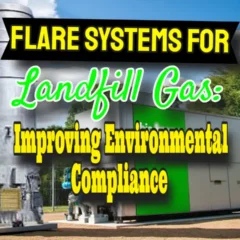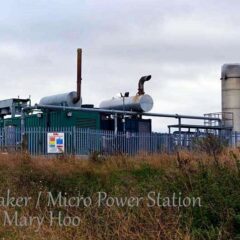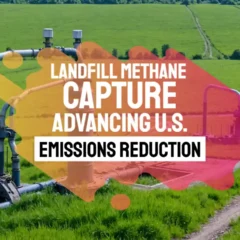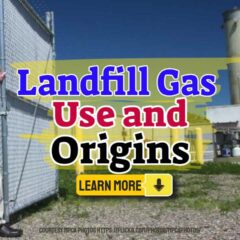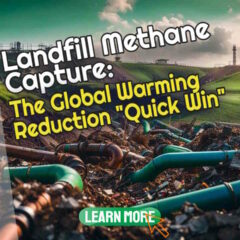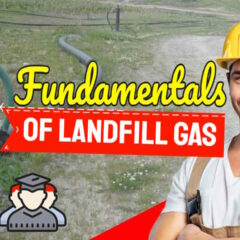Landfill Gas Management
Landfill Gas Management is an important necessity at most landfills receiving degradable wastes such as MSW and many non-hazardous industrial wastes. It is necessary to extract landfill gas in order to prevent it from migrating away from the landfill.
Landfill gas (LFG), a mixture of methane and carbon dioxide, has the potential to cause harm to human health, via explosion or asphyxiation, and to cause environmental damage such as crop failure. It also has a significant climate changing effect in the world’s atmosphere.
Examples of all three have occurred both within and outside landfills and are discussed here.
Landfill Gas Management is applying good practice techniques for extracting and controlling LFG. All are are now reasonably well established and in common use, and are discussed in this category.
Flare Systems for Landfill Gas: Improving Environmental Compliance
Landfill flare systems convert harmful methane into less potent carbon dioxide, reducing greenhouse impact. Enclosed flares offer up to 99.9% efficiency. Compliance with EPA regulations and maintenance are critical for optimal performance, ensuring these systems help us meet environmental goals and protect communities from emissions…
Landfill Gas Power Plants
Landfill Gas Power Plants should be installed at all landfills, where the landfill gas (LFG) extraction rate is large enough to sustain a steady flow for long periods (multiple years). A typical Landfill Gas Power Plant for most landfill sites is an internal combustion engine, or possibly a gas turbine. The typical landfill gas power plant is used […]
Best Portable Landfill Gas Analyzer Reviews & Comparison
Landfill gas monitoring is critical for health, safety, and compliance. A top-notch portable analyzer detects harmful gases in real-time, safeguarding workers and the environment. As regulations tighten, reliable equipment becomes essential for avoiding fines and mitigating risks associated with gas emissions from decomposing waste…
Methane Emissions from Landfills: Problems and Solutions
Methane emissions from landfills significantly contribute to climate change due to their potent greenhouse effect. Capturing and utilizing landfill gas as energy, reducing organic waste, and enhancing recycling are vital solutions. Community engagement and effective policy regulations are key to mitigating these emissions and tackling global warming effectively…
Landfill Gas Pin Wells: A Low-Cost, High-Impact LFG Extraction Option
Discover the advantages of landfill gas pin wells, a cost-effective solution for efficient LFG extraction. Easier installation, lower costs, and increased gas capture make them ideal for sustainability. Learn how pin wells transform waste into energy, reducing emissions and supporting renewable projects across waste management facilities…
Why Do Landfill Gas Monitoring in Soil, the Air, Near the Surface, & In Confined Spaces
Landfill gas monitoring is critical for preventing health risks and hazards near landfill sites. Detecting gases like methane, which is flammable and a climate change contributor, is essential. Effective monitoring employs soil, air, and emissions techniques to ensure safety and environmental protection…
Landfill Gas Capture: Advancing U.S. Emissions Reduction Through Technology and Policy
Harnessing Landfill Gas: Progress and Challenges in U.S. Emissions Reduction Efforts The management of landfill-derived gas represents one of the most significant opportunities in America’s climate strategy. As a potent greenhouse gas with 28-36 times the warming potential of carbon dioxide over a 100-year period, methane demands urgent attention from policymakers, waste management professionals, and […]
Landfill Gas Use and Origins
Landfill gas use is the collection and treatment of methane or other gaseous substances from the decomposition of waste in a landfill to create power, heat, and energy. In addition to fossil fuels and farming, municipal solid waste (MSW) landfill gas was third in the world as the contributor to methane emissions as a greenhouse […]
Landfill Methane Capture: The Global Warming Reduction “Quick Win” You’ve Never Heard Of
Concerned about the menacing effects of landfill gas on our environment? You’re not alone, but it’s not as bad as it might be where a landfill has a well-engineered Landfill Methane Capture system installed. In fact, we go so far as to say that landfill methane capture and utilisation is the global warming reduction “Quick […]
Fundamentals of Landfill Gas
Understanding the fundamentals of landfill gas is crucial for environmental researchers, waste management professionals, and many others engaged in addressing climate change. A natural byproduct of organic material decomposition in landfills, this flammable gas plays a substantial role in global warming due to its composition. While not odorous if well managed it is closely associated […]

